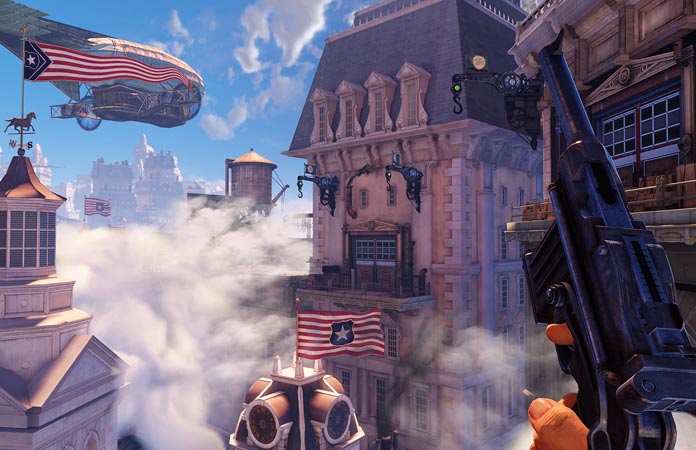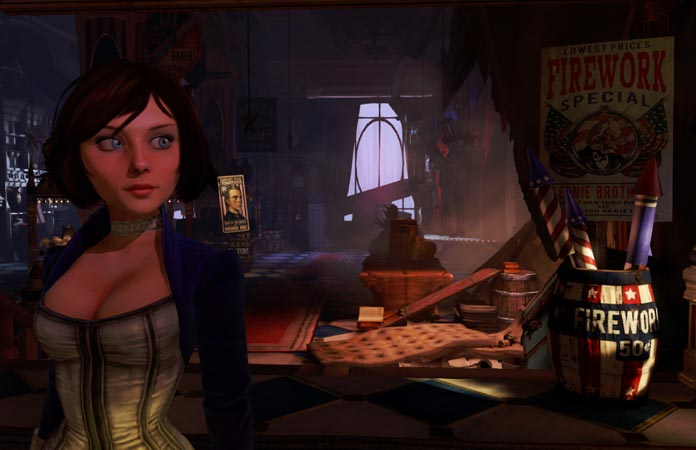Reasons To Care About Bioshock Infinite
Published on January 21st, 2013 in: Gaming, Science Fiction |By Paul Casey

Bioshock, released in 2007, is in my estimation, the greatest video game of its generation. My feelings on that game and its importance are documented elsewhere on Popshifter. As we approach the release of Bioshock Infinite on March 26, it seems prudent to expand on why Irrational Game’s new work has a good chance at taking that title from its predecessor.
Those who value Bioshock above most or all other video games are proponents of a different value system. The thought that the first-person shooter mechanics are not the most important part of the game is alien to most who spend their time playing competitively online with Halo or Call of Duty. That horrendous cliché of the “Emperor’s New Clothes” is wielded in these instances with folded arm assurance. Bioshock, along with other games like Uncharted, Heavy Rain, and most recently The Walking Dead, shows, though, that all of the other things around those core mechanics matter just as much, if not more, to a fair heft of people.
Bioshock Infinite has a good chance of being the definitive game of 2013, and the end of a console generation that has gone on longer than any before it. Much talk has been spent on the delays of the game. There has also been chatter about the exits from the company, including art director Nate Wells who left last August. There are, however, some good reasons to think that Ken Levine and his team at Irrational Games will still hit their mark.
This should be at the front of everyone’s minds when making assumptions about the relative troubles of this production. Yes, of course delays and exits from the company could be signs of a game set to fail—the horrendous Duke Nukem Forever being the worst offender in that regard—but they could also be a sign of the demanding nature of the work.
Some of the most important creations of the last hundred years have been those of terrible struggles. Think of Apocalypse Now for pity’s sake, which nearly killed its lead actor. Or Finnegan’s Wake, which took James Joyce 17 years to write. In creative terms, the delays and friction between those working to get the project on the right track, Bioshock Infinite is small potatoes. When Infinite is released we will see if the effort results in a quality game, but what is already clear is that this is not the work of a contented, comfortable group of people. This is a good thing.
Many publications received hands on time with the game in December. Outlets such as Destructoid and Wired had very good things to say about the game’s first few hours. While Infinite has seemingly changed a good measure since its initial reveal, and possibly even since 2011’s stunning E3 presentation, there is enough visual evidence to suggest that this could be very special indeed.
It moves well, particularly the use of the skyhook, which from the recent VGA footage looks to be a thrilling element of how Infinite‘s combat works. It now seems to be clear that this is a fully interactive element, and looks set to change the tone of what Bioshock can be. The scale of the environments are, likewise, exciting as all hell. Columbia seems to be as intricately realized as Rapture. With the player now being a part of the events that turn a utopia to a dystopia, it seems likely that many will become as attached to this new land in the sky, as they were to the one on the seabed.
3. The importance of the narrative experience is greater than ever.
The context in which the story takes place has great potential. The Devil In the White City by Erik Larson—which details the 1893 Chicago World’s Fair and parallels its creation with one of America’s first serial killers Dr. H.H. Holmes—is cited by Ken Levine and others at Irrational as being of fair importance in establishing the setting, tone, and subject matter of Infinite. It is easy to see why it would appeal. For as much as it was indebted to Ayn Rand, the contrasting of a severely ambitious, inspiring, architectural project with the darkest possible side of humanity also defined Bioshock.

Infinite is set in 1912, and like Larson’s book deals with the beginnings and consequences of American exceptionalism, and the way in which patriotic fervor can pervert justice. It deals with racism and touches on such shameful events as the “Massacre at Wounded Knee.” It also takes place in a city in the sky, and looks set to involve more overt science fiction elements than the original. That this game is not directly involved or concerned with the events of the previous games raises the enticing prospect of a series of original stories linked by a similar philosophy, which can avoid the financial terror of an unknown series.
More important even than the historical and genre elements involved, is the person you are paired with. One look at what Irrational are trying to do with Elizabeth is enough to make me cover up and stutter myself to sleep in a dribbly, old-timey fever.
From his interview with Eurogamer this past December, Ken Levine talks about how Elizabeth interacts with the world around her:
“One thing AIs generally don’t do is react to what’s around them,” Levine said. “They don’t observe what’s around them. They have no interest in what’s around them. So we spent a lot of time making Elizabeth notice the world and react to the world and engage with the world. That was heightened by the fact she’s been locked up. But even so, people are always looking at stuff. When you walk down the street you don’t walk down the street like a robot, which is generally what companion AIs do.
“So we had to seed the world with things she was interested in and things she could interact with. We had to seed her with various emotional states that are primarily an overlay on the animation she does. And she has sounds to go along with all of those things. Making her present in the world was one of the most difficult things and one of the most important things.”
What frustrated me most about Bioshock was failing to find enough people to experience it with me. The need to proselytize was great, but even buying copies for people did not ensure that I would be able to properly share it. With Infinite the connection is not only between the player and the world, but the player, the world, and Elizabeth. There were people to pity in the original, and in a sense to help—with the Little Sisters—but the player was largely left to pursue his or her own appetites. A look at how well Telltale Games bonded the player to Clementine—the girl left in your care—in the superb The Walking Dead, gives some sense of the possibilities for a character like Elizabeth.
The fall of Columbia, unlike Rapture, will not simply be a thing of horrific beauty. There are people you really care about here. This time the player is set to experience it from the inside and the desperation when it comes apart. It will be a pleasure to despair.
Time limit is exhausted. Please reload the CAPTCHA.